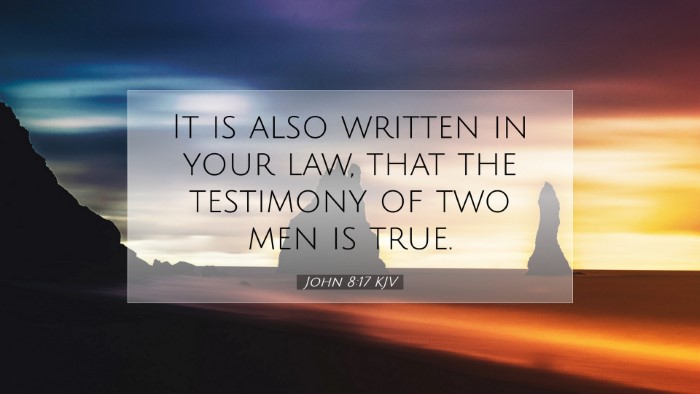Commentary on John 8:17
John 8:17 states: "It is also written in your law that the testimony of two men is true." This verse appears within a larger discourse where Jesus addresses the Pharisees concerning the nature of His authority and mission.
Contextual Overview
The setting of John 8:17 unfolds in the Temple, where Jesus teaches amidst rising tension with the Jewish leaders. The verse references the Jewish legal requirement of validating claims through multiple witnesses, echoing Deuteronomy 19:15. This legal principle underscores the importance of corroborating testimony, especially when addressing matters of great significance, such as the identity and authority of Jesus.
Insights from Public Domain Commentaries
Matthew Henry's Commentary
Matthew Henry emphasizes the contrast between human judgment and divine authority. He notes that the Pharisees had failed to recognize Jesus' divine witness due to their reliance on their own interpretations of the Law. His commentary highlights the irreducibility of truth, arguing that spiritual truths transcend human law, and Jesus' divinity confirms this reality. Matthew Henry further expounds on how Jesus, as the eternal Son, serves as both the testimony and the testifier, making His witness inherently credible.
Albert Barnes' Notes on the Bible
Albert Barnes delves into the implications of Jesus' assertion regarding testimony. He elucidates that Jesus refers to the Law not only to assert His legitimacy but also to expose the hypocrisy of the Pharisees. They prided themselves on adherence to the Law, yet they rejected the truth embodied in Christ. Barnes points out that Jesus utilizes this reference to challenge the leaders' understanding and application of scripture, compelling them to acknowledge that the validation of testimony lies beyond mere adherence to the Law; it necessitates spiritual discernment.
Adam Clarke's Commentary
Adam Clarke provides a detailed analysis of the specific phrase, emphasizing the weight of multiple witnesses in establishing truth. Clarke explains that in Jewish culture, the requirement of two witnesses was not merely procedural but deeply theological, affirming God's character of justice. He connects this to Jesus’ dual nature as both witness and the one witnessed, thereby elevating the nature of His testimony. Clarke's interpretation urges the reader to recognize the import of divine witness against human fallibility in understanding God’s salvation plan.
Theological Implications
The theological ramifications of John 8:17 extend beyond the immediate discourse. This verse illustrates essential Christian doctrines, including:
- The Nature of Testimony: Establishing the credibility of Jesus' claims through a divine standard rather than solely human criteria.
- Authority of Christ: Affirmation of Jesus’ authority as coming from the Father, who stands as the ultimate witness.
- Understanding Truth: A challenge for believers to seek deeper truths that transcend surface-level interpretations of Scripture.
Application for Ministry and Scholarship
For pastors, scholars, and students, John 8:17 serves as a vital text highlighting the importance of sound doctrine and the need for witnesses in theological discourse. It encourages a multi-faceted approach to understanding Scripture through:
- Engagement with the Text: Encouraging deep scriptural study that considers the totality of the Bible's witness to Christ.
- Discernment in Interpretation: Recognizing the danger of relying solely on human reasoning or tradition without the backing of spiritual truth.
- Community of Believers: Building a community that values collective wisdom and discernment grounded in prayer and the Holy Spirit.
Conclusion
In summary, John 8:17 is a pivotal verse that highlights the necessity of divine testimony and the complexities surrounding authority, truth, and interpretation. Insights drawn from historical commentaries furnish contemporary readers with a deepened understanding of Christ’s message and the monumental implications of His claims. As one reflects on this verse, it becomes evident that the pursuit of truth in Christ must always honor the witness of the Word, rooted in a holistic understanding of Scripture.


